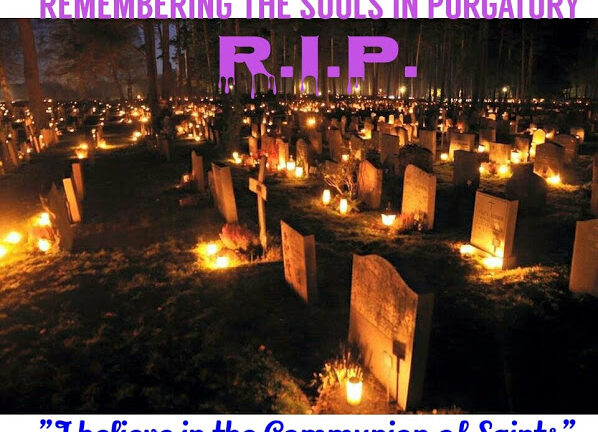Following the Solemnity of All Saints which the Church celebrated yesterday, today She celebrates the Commemoration of the faithful departed – “ALL SOULS”. With the celebration of the Saints in Heaven and the souls of the faithful who died in Christ, we come about a full understanding of the faith we profess: – “I BELIEVE IN THE COMMUNION OF SAINTS”. What do we mean by the Communion of Saints? By the Communion of Saints, We believe that the “THREE CHURCHES” are in communion with each other. Put differently, the Saints in heaven (the Triumphant Church) are in communion with the “Saints” (we) on earth (the Pilgrim Church) by their intercessions and prayers – this was what I discussed yesterday. Also, we (the pilgrim Church) are equally in communion with the holy souls in purgatory (Suffering Church), by our prayers, penance and good works for them, so that they could gain admittance to Heaven (the Triumphant church). Therefore, our prayers today is geared towards the release of the souls in Purgatory. And I guess one might be tempted ask: “Is it biblical to pray for the dead?” It is VERY BIBLICAL, in fact; it is a cultural, holy and wholesome thought. How could we explain this?
The Church’s pious act of praying for the dead is very biblical, for it dates back from early Judaism down to the New Testament Times, and so forth. Have we ever wondered why the acronym “R.I.P” is inscribed at the tomb of those who have died? What does it mean? The abbreviation R.I.P., meaning “Rest in Peace”, is a direct translation of the Latin “Requiescat in pace”. “Requiescat in pace” was an offered prayer to God, in the hope that the soul of the deceased person would find peace in the next life. It simple terms it was a short prayer for the dead. Its origins are found in Hebrew, in the Book of Isaiah chapter 57 verse 2: “Those who walk uprightly enter peace; THEY FIND REST AS THEY LIE IN DEATH.” Hence, it was a prayerful request that the souls of those who have died should find peace in the afterlife. It is so funny and contradictory that those who criticize the Catholic belief of Purgatory, end up using the phrase Rest in Peace” at the death of a loved one/friend. If only Heaven and hell exist in the great beyond, why then pray “rest in peace”? For the prayer would make no sense if the soul is already in heaven or hell. Let us consider the few biblical passages where people prayed for the dead:
– 1 Samuel 31: 8-13: “On the morrow, when the Philistines came to strip the slain, they found Saul and his three sons fallen on Mount Gilboa. And they cut off his head, and stripped off his armour, and sent messengers throughout the land of the Philistines, to carry the good news to their idols and to the people. They put his armour in the temple of Ashtaroth, and they fastened his body to the wall of Bethshan. But when the inhabitants of Jabesh-Gilead heard what the Philistines had done to Saul, all the valiant men arose, and went all night, and took the body of Saul and the bodies of his sons from the wall of Beth-shan; and they came to Jabesh and burnt them there. And they took their bones and buried them under the tamarisk tree in Jabesh, and fasted for seven days.”
NOTE- HERE IS A PRIME EXAMPLE WHERE PEOPLE FASTED FOR THE DEAD – NAMELY SAUL AND HIS SONS.
– In 2Timothy 1: 16-18: “May the Lord grant mercy to the household of Onesiphorus, for he often refreshed me; he was not ashamed of my chains, but when he arrived in Rome he searched for me eagerly and found me; may the Lord grant him to find mercy from the Lord on that Day; and you know well all the service he rendered at Ephesus.”
NOTE – HERE PAUL PRAYS FOR HIS DEAD FRIEND ONESIPHORUS. Note the past tense in all of Paul’s references to him, and how Paul prays for his family remaining behind.
Sequel to these biblical passages above, the doctrine of Purgatory becomes clearer. Purgatory is a doctrine greatly misunderstood, ranging from non-Catholics to lukewarm Catholics. A proper understanding of its meaning is pertinent for a proper analysis of what we are celebrating today.
Let me begin by saying WHAT PURGATORY IS NOT: it is NOT the belief that we can pray people into heaven from hell. Hell, like heaven, is eternal; neither will ever pass away and those souls therein are consigned eternally. If this is so, what then is purgatory? Purgatory, on the other hand, is temporary. Any soul in purgatory is destined for heaven inevitably. The popular misunderstanding of purgatory, i.e., praying people into heaven from hell, is therefore INCORRECT. Purgatory is the state, after death, where souls who are not yet perfected in their love for God, are purified by fire before admittance to the ALL HOLY GOD. What gets purified? – “unrepented venial sins”, that is, sins that do not lead to “death” (cf. 1John 5:16-17). According to this first letter of St. John, There are sins that lead to death, and there are sins that do not lead to death. It is important to note that this kind of “death” is the eternal death in hell. Hence, if there are sins that do not lead to hell, where would it lead to? It would not lead to heaven either because God and sin (even the minutest sin) cannot coexist. Just as we understand from the scripture that “NOTHING UNCLEAN shall enter the kingdom of God” (Rev. 21:27). Hence, those sins that do not lead to death (hell), and do not lead to heaven either, must lead to an intermediary state that necessarily needs purification to achieve heaven.
How is this possible? Does Scripture justify this? In 2 Corinthians 5.10, we read: “For we all must appear before the judgment seat of Christ, that each may receive what is his due for the things done while in the body, whether good or bad.” What will happen to a Christian who appears before the judgment seat of Christ with bad deeds? Paul gives us the answer in his first letter to the Corinthians: “His work will be shown for what it is, because the Day will bring it to light. It will be revealed with fire, and the fire will test each man’s work. If what he has built survives, he will receive his reward. If it is burned up, he will suffer loss; he himself will be saved by passing through fire (as one escaping through flames)” (1Co 3.15). Paul plainly tells us that Christians with bad deeds who approach Christ the Judge will find themselves in a fire, burning away those deeds. Such a place is not hell for Paul is speaking of saved Christians: “he himself will be saved.” It cannot be heaven because it involves suffering by fire: “he will suffer loss…as one escaping through flames.” Could it be on earth during this life? For Paul “the Day” always refers to the day we are judged. Hence, it would not be on earth. Where is this place where Christians suffer loss by fire? IT MUST BE PURGATORY. Purgatory simply means to purge away (to cleanse, to purify).
Dear friends in Christ, Purgatory is a doctrine of DIVINE MERCY. It portrays the abundant mercy of God, a just God who’s slow to anger and rich in mercy. Little wonder we read in the Psalms: “if you O Lord should mark our guilt, who will survive? But with you is found forgiveness, for this we revere you” (PS.130:3-4). It is a recognition that most Christians are not so evil as to warrant hell and most are not yet perfected as to warrant immediate entrance into heaven. Purgatory makes perfect sense.
According to the Catechism of the Catholic Church, 1030: “All who die in God’s grace and friendship, but still imperfectly purified, are indeed assured of their eternal salvation; but after death, they undergo purification, so as to achieve the holiness necessary to enter the joy of heaven.” In CCC 1031, The Church gives the name Purgatory to this final purification of the elect, which is entirely different from the punishment of the damned. Thus, as for those with certain lesser faults, we must believe that, before the Final Judgment, there is a purifying fire. This is why we pray today for the “Suffering Church” in Purgatory, that is, the dead ones suffering from fewer blows to be released from their suffering.
I believe we can see for ourselves why it is necessary to pray for the dead – i.e., for those who have gone to purgatory in order that they might be freed from their temporal punishments.
On this special day, dear friends in Christ, we pray: “Remember those, O Lord, who have died in your peace, but may not gain love’s high reward, till Love is purified…” May the souls of all the faithful departed, through the mercy of God rest in peace. Amen.
Kindly visit a cemetery, and say a prayer for the departed ones. A plenary indulgence is granted for visiting a cemetery every day throughout this month (November) for this year, as decreed by the Holy See, and a partial indulgence, on any day of the year.
Shalom!
© Fr. Chinaka Justin Mbaeri, OSJ
Paroquia Nossa Senhora de Fatima, Vila Sabrina, São Paulo, Brazil
nozickcjoe@gmail.com / fadacjay@gmail.com
___________________________________
PS: Have you prayed your Rosary today?





Padre thanks so much for taking your time to explain and clarify the doctrine of praying for the dead. So so much enlightened
May d perpetual light shine upon our department brothers and sisters and may their souls rest in peace Amen.
I mean to say departed brothers and sisters pls
Eternal rest grant on to them I Lord and let perpetual light shine on them, may they rest in perfect peace amen.
Thanks so much Fr. Chinaka for this Scriptural insight about purgatory and prayer for the dead. I have so much joy praying for my departed family members with the hope that when I’m no longer here someone will also pray for me.
God bless you Fr for this indepth teaching about praying for the dead.
Thank you Padre for taking your time to explain to us more about purgotry ,may the soul of the faithful departed through the mercy of God rest in peace.
May the souls of all the faithful departed, through the mercy of God rest in peace. Amen
May the souls of my family members, friends, colleagues and the souls of the faithful departed through the mercy of God rest in peace amen.
I find this piece very enlightening. Thanks so much Father. The beginning of November always brings me so much pain because I lost two siblings in this month. However,I offer that horrible pain that has refused to be healed for a decade now to God as a sacrifice for the repose of the departed souls. Amen.
Eternal rest grant unto them who have gone before us
Thanks Padre,
To be sincere i am always confused about this.
May Almighty God bless you and grant you unction to function in Jesus name. Amen
Nothing unclean will enter heaven. We therefore pray for those who must make retribution for their sins, that God will grant them mercy and purify them so they can enter heaven. They in turn will pray for us. May the Lord accept our sacrifices for them, through Christ our Lord. Amen.